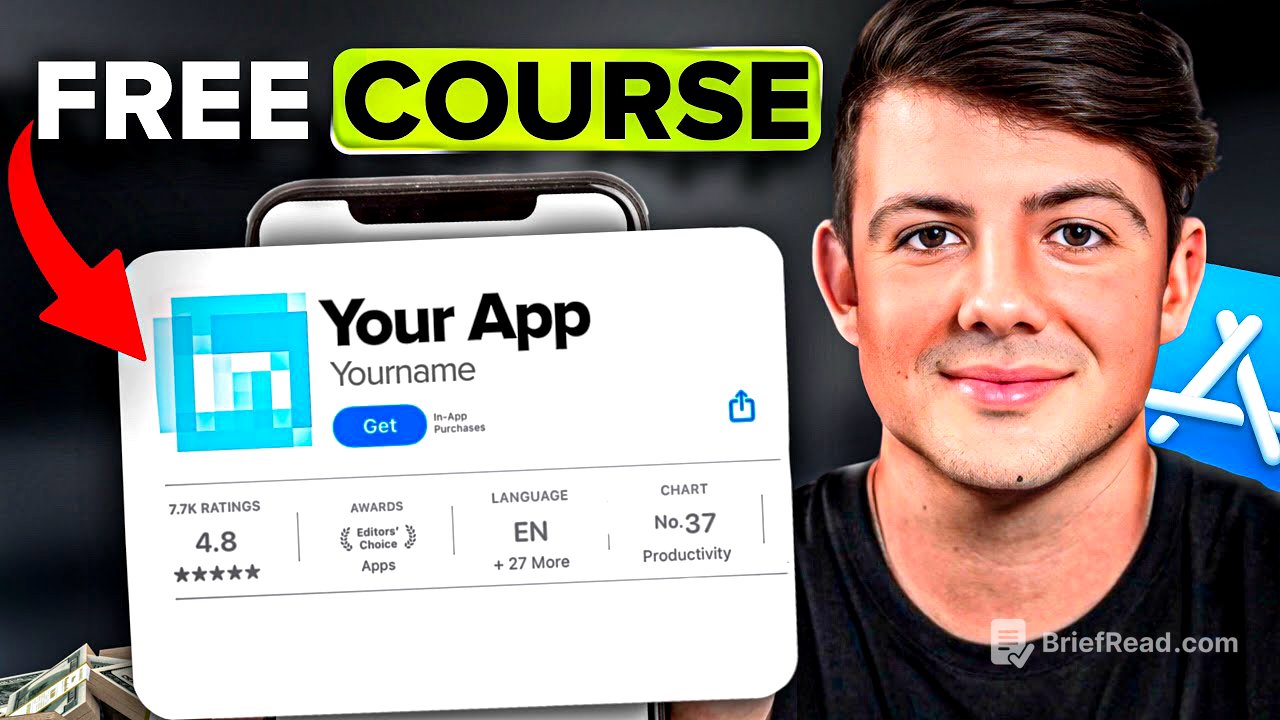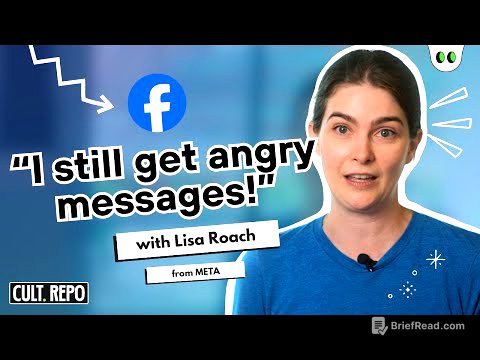TLDR;
This video provides a comprehensive guide on building, scaling, and exiting a mobile app business. The video covers four key steps: ideation and validation, design and development, organic marketing, and scaling with paid ads. The speaker emphasizes the importance of market research, a marketing mindset, and building a strong team. He also shares his personal experiences and insights gained from building successful mobile apps, including his quit vaping app, Puff Count.
- Ideation and Validation: The video explains how to identify app ideas by analyzing everyday problems and researching trending topics on social media and app marketplaces. It also covers using tools like Sensor Tower and Google Trends to validate app ideas and ensure their market viability.
- Design and Development: The video emphasizes the importance of a marketing mindset when developing app ideas. It then guides viewers through the process of creating wireframes, using 99designs for UI design contests, and hiring developers on Upwork.
- Organic Marketing: The video highlights the importance of organic marketing on platforms like TikTok, Instagram Reels, and YouTube Shorts. It emphasizes the need for market research to understand trending content formats and create engaging videos that convert viewers into app downloads.
- Scaling with Paid Ads: The video explains how to scale a mobile app business with paid ads on platforms like Facebook and TikTok. It emphasizes the importance of optimizing ad campaigns for different events, such as views, clicks, installs, trials, and subscriptions. The speaker also shares his strategy for achieving a 3:1 customer acquisition cost (CAC) to lifetime value (LTV) ratio.
- Posted: The video introduces a new platform called Posted, which allows brands to run Tik Tok content contests to find viral videos and scale their marketing efforts.
Where to Start: Finding and Validating Your Mobile App Idea [0:00]
The video begins by emphasizing the potential of mobile apps as a business model, highlighting their ability to generate recurring revenue and build enterprise value. The speaker then shares his own experience in the mobile app space, detailing his journey from building simple games in high school to achieving seven-figure revenue on the App Store. He emphasizes that he didn't design any screens or write any code for his apps, showcasing the possibility of building a successful mobile app business without technical expertise.
The video then dives into the first step: ideation and validation. The speaker suggests analyzing everyday life to identify problems that could be solved with a mobile app. He uses his own experience with Puff Count, a quit vaping app, as an example, explaining how he identified a trending problem and validated its marketability through social media research. He also recommends exploring app marketplaces like Flipa and Acquire Now to understand successful apps and generate ideas.
The video then introduces tools like Sensor Tower and Google Trends for validating app ideas. Sensor Tower provides insights into app earnings, while Google Trends reveals the organic interest in specific products or problems. The speaker emphasizes the importance of choosing a product with upward trending interest, indicating its potential for growth.
Marketing Mindset: The Key to Success [7:32]
The video emphasizes the crucial role of a marketing mindset when developing app ideas. The speaker argues that a marketable product is essential for success, regardless of the app's quality. He explains how his understanding of Puff Count's marketability on TikTok allowed him to drive hundreds of thousands of downloads, even before the app was fully developed. He highlights the importance of understanding how people will find and engage with your product.
The speaker then shares his strategy for validating a product's marketability before investing time and money. He recommends researching relevant keywords on TikTok, analyzing the views and likes of existing videos, and identifying trends and formats that resonate with the target audience. He emphasizes the importance of understanding what makes content go viral within a specific niche.
Feasibility: Is Your Idea Worth Building? [9:45]
The video emphasizes the importance of assessing the feasibility of an app idea before starting development. The speaker explains how he determined that Puff Count was feasible because it involved building a simple tracker, making it relatively easy to create a minimum viable product (MVP). He encourages viewers to pursue ideas that they can't stop thinking about, even if they're not 100% certain of their success. He emphasizes the importance of taking action, adapting to challenges, and persevering through initial setbacks.
The speaker then shares his process for brainstorming and documenting app ideas. He uses a brain dump approach, outlining the app's features, pages, and competitors in a single document. This helps him visualize the app's structure and solidify his vision.
Designing Your App: UI Design Contests [11:33]
The video moves on to the design and development phase, emphasizing the importance of visualizing the app's user interface (UI) before starting development. The speaker recommends creating wireframes, which are simple sketches of the app's layout and screens. He then introduces 99designs, a platform for running UI design contests.
The speaker explains how 99designs allows users to upload their wireframes and briefs, launching a contest where designers submit their interpretations of the app's UI. He highlights the benefits of this approach, including receiving multiple design options, learning from different styles, and finding the most optimal design for the app. He shares his own experience with a 99designs contest for his macro tracking app, showcasing the winning design and explaining how he plans to incorporate elements from other submissions.
Finding Your Developer: Upwork and Eastern Europe [17:35]
The video focuses on finding a developer to bring the app's design to life. The speaker recommends Upwork, a freelancer platform, over Fiverr, highlighting his own extensive experience using Upwork and his preference for its platform. He then guides viewers through the process of posting a job on Upwork, outlining the key details to include in the job description, such as the app's purpose, features, and UI design.
The speaker emphasizes the importance of hiring developers from Eastern Europe, citing their high quality of work, competitive pricing, and strong work ethic. He advises against hiring from agencies unless working with a larger budget. He recommends reaching out to potential developers for a quick call to discuss the project and assess their professionalism.
Organic Marketing: TikTok and Short-Form Content [25:43]
The video transitions to the organic marketing phase, emphasizing its importance as a low-cost way to reach an audience and validate product-market fit. The speaker shares his experience with Puff Count's TikTok account, showcasing its 120,000 followers and consistently high view counts. He attributes his success to market research and understanding what content goes viral on TikTok.
The speaker then provides a step-by-step guide to conducting market research on TikTok. He recommends searching for relevant keywords, filtering videos by like count, and analyzing the top-performing videos to identify trends, hooks, storylines, and call-to-actions. He emphasizes the importance of replicating successful formats and creating content that resonates with the target audience.
Optimizing Your Pay Wall: Superwall and Hard Pay Walls [32:18]
The video focuses on optimizing the pay wall, a crucial element for monetizing a mobile app. The speaker explains that app downloads are meaningless without conversions and revenue. He defines the pay wall as the point where users are presented with a free trial or a paid option to access the app's full features.
The speaker then introduces Superwall, a tool for building and testing pay walls without pushing updates to the app. He highlights its ability to AB test different pay wall designs, pricing options, and text variations. He shares his own experience with Superwall, showcasing his ongoing AB testing campaigns and the winning pay wall design based on conversion rates.
The speaker also emphasizes the importance of using hard pay walls, which require users to pay or opt into a free trial to access the app's full features. He claims that hard pay walls have significantly increased his conversion rates compared to soft pay walls, which allow users to skip the pay wall with a simple click.
Scaling with Paid Ads: Facebook and TikTok [35:30]
The video moves on to scaling with paid ads, emphasizing that it becomes easier once a strong foundation of organic content is established. The speaker shares his strategy for achieving a 3:1 CAC to LTV ratio, explaining how he spends $1 on paid ads and generates $3 to $4 in return. He highlights the importance of optimizing ad campaigns for different events, starting with views and engagement and gradually working towards installs, trials, and subscriptions.
The speaker emphasizes the need to feed the ad platforms with data about the product and audience, allowing them to learn and optimize campaigns for profitability. He explains how he uses Facebook's Events Manager to track different events and optimize campaigns for each stage of the user funnel. He also shares his experience with scaling winning campaigns and expanding his target audience globally.
Posted: Tik Tok Content Contests [48:01]
The video concludes by introducing Posted, a new platform that allows brands to run Tik Tok content contests. The speaker explains how Posted works, allowing brands to set a budget, establish rules, and target specific demographics. Creators submit videos in hopes of winning the contest and generating viral content for the brand.
The speaker highlights the benefits of Posted, including finding viral videos, learning from creators, and scaling marketing efforts. He emphasizes that each submission receives organic lift through the creators' own Tik Tok accounts, potentially driving additional downloads and engagement. He concludes by encouraging viewers to sign up for Posted and start running their own Tik Tok content contests.








![그토록 바라던 진짜 해답을 드리겠습니다 [쓰르라미 울 적에 챕터7]](https://wm-img.halpindev.com/p-briefread_c-10_b-10/urlb/aHR0cDovL2ltZy55b3V0dWJlLmNvbS92aS82YlFDMEU2R3lBTS9ocWRlZmF1bHQuanBn.jpg)
